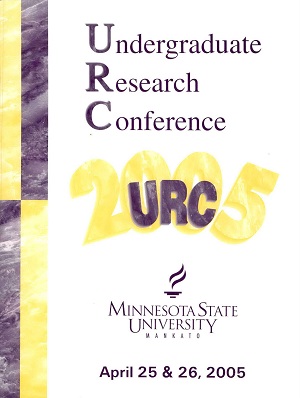Responding to Direct Questions by Adolescents with Williams Syndrome and Their Typically Developing Peers
Location
CSU 253
Start Date
25-4-2005 1:15 PM
End Date
25-4-2005 3:15 PM
Student's Major
Speech, Hearing, and Rehabilitation Services
Student's College
Allied Health and Nursing
Mentor's Name
Patricia Hargrove
Mentor's Department
Speech, Hearing, and Rehabilitation Services
Mentor's College
Allied Health and Nursing
Description
Children with Williams syndrome have been described as "children who test as retarded, speak as though gifted, behave sometimes as though emotionally disturbed, and function like the learning disabled" (Semel and Rosner, 2003, p.l). As a result of this complex pattern of performance, researchers have studied their unique characteristics. Research has typically focused on comprehension by standardized tests. However, less attention has been directed to the ability to understand information from conversations and stories. The purpose of this study was to examine the accuracy of responses to direct questions relating to stories (narratives). Six age and gender matched pairs of adolescents with Williams syndrome and typically developing adolescents listened to a prerecorded narrative and responded to direct questions about the narrative. Out of a possible twenty points, the mean score for participants with Williams syndrome was twelve and the mean score for the mean score for the typically developing peers was seventeen. This proved to be a statistically significant difference. Results from this study indicate that adolescents with Williams syndrome performed better than expected for individuals with developmental delays, but lower than their typically developing peers.
Responding to Direct Questions by Adolescents with Williams Syndrome and Their Typically Developing Peers
CSU 253
Children with Williams syndrome have been described as "children who test as retarded, speak as though gifted, behave sometimes as though emotionally disturbed, and function like the learning disabled" (Semel and Rosner, 2003, p.l). As a result of this complex pattern of performance, researchers have studied their unique characteristics. Research has typically focused on comprehension by standardized tests. However, less attention has been directed to the ability to understand information from conversations and stories. The purpose of this study was to examine the accuracy of responses to direct questions relating to stories (narratives). Six age and gender matched pairs of adolescents with Williams syndrome and typically developing adolescents listened to a prerecorded narrative and responded to direct questions about the narrative. Out of a possible twenty points, the mean score for participants with Williams syndrome was twelve and the mean score for the mean score for the typically developing peers was seventeen. This proved to be a statistically significant difference. Results from this study indicate that adolescents with Williams syndrome performed better than expected for individuals with developmental delays, but lower than their typically developing peers.
Recommended Citation
Howk, Kayla; Laura Lindema; Erin Rath; and Amanda Simon. "Responding to Direct Questions by Adolescents with Williams Syndrome and Their Typically Developing Peers." Undergraduate Research Symposium, Mankato, MN, April 25, 2005.
https://cornerstone.lib.mnsu.edu/urs/2005/poster-session-A/2




